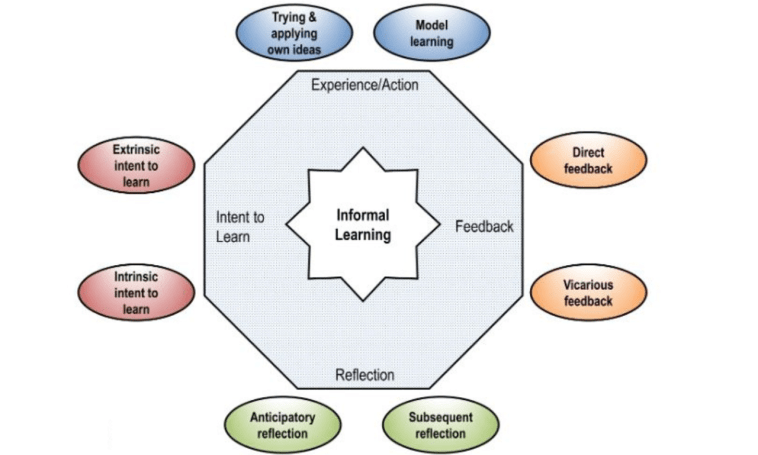In the vast labyrinth of human communication, where words serve as the primary tools of expression, we often encounter phrases, sayings, and references that are not immediately clear. These Informal or Indirect expression of knowledge are the puzzle pieces that enrich our dialogues, adding depth and intrigue to our interactions. This article unravels the enigma of these expressions, delving into the realms of idioms, figurative language, vernacular, and more.
Figurative Language: Unmasking the Abstract
Figurative language is an engaging form of informal communication that subtly imparts knowledge through indirect means. Its power resides in the ability to transform the literal into the abstract. Metaphors, similes, and personification are classic examples, revealing a vibrant landscape of emotions and concepts, often conjuring images that capture the imagination and drive home their intended meaning.
For instance, the metaphor ‘time is a thief’ doesn’t mean time literally steals, but it portrays how quickly moments pass, often unnoticed, hence encapsulating an essential piece of wisdom about the transient nature of life.
Idioms: The Colourful Mosaic of Language
Another integral component of an Informal or Indirect expression of knowledge expression is idioms, which are unique to each culture and language. These quirky phrases may seem bewildering to the uninitiated, but they convey valuable knowledge and cultural insights.
The English idiom ‘kick the bucket’ has nothing to do with physically kicking a bucket; it’s a euphemism for death. The idiom underscores the importance of cultural references in decoding informal expressions, highlighting how language and culture are intricately woven together.
Slang and Colloquial Expressions: The Unwritten Language of the Streets
Slang and colloquial expressions, often deemed the language of the streets, serve as an informal code among specific groups. These expressions are dynamic and continuously evolve, reflecting societal changes and trends.
Consider the slang term ‘lit,’ which in current usage means exciting or excellent. This word, once a mere descriptor of illumination, has transformed into an adjective conveying positive sentiment. Understanding slang requires familiarity with the context in which it’s used, and it offers a unique perspective on the shifting cultural and societal landscape.
Proverbs: Timeless Pearls of Wisdom
Proverbs, the age-old adages brimming with wisdom and life lessons, are another key aspect of indirect knowledge expression. They often employ metaphorical language and cultural references to convey profound messages.
Take, for example, the proverb ‘don’t count your chickens before they hatch.’ This saying is a caution against taking future gains for granted, imparting a valuable lesson on prudence and patience.

Jargon: The Insider’s Language
Every specialized field, from medicine and law to cooking and sports, has its unique jargon – a collection of terms and phrases known primarily to insiders. While it may appear alien to outsiders, jargon facilitates effective communication within the field, often expressing complex concepts succinctly.
Consider the word ‘blue-chip’ in the world of finance. It refers to a company with a reputation for quality, reliability, and ability to operate profitably in good and bad times – a wealth of information encapsulated in a two-word phrase!
Demystifying Informal and Indirect Knowledge Expressions
Recognizing the various facets of informal and indirect knowledge expression is not merely an exercise in linguistics but an invitation to understand the cultural, societal, and historical contexts that give rise to these expressions. It is a journey into the heart of human creativity and ingenuity in language use.
Deciphering these expressions can be a thrilling intellectual challenge, whether you’re navigating the idiomatic waters of a foreign language or decoding the jargon of a new field. However, this exploration is also a gateway to deeper comprehension and enhanced communication skills, invaluable tools in our interconnected world.
Vernacular: Embracing Regional Flavor
Vernacular language or dialects bring another facet to our understanding of Informal or Indirect expression of knowledge. These forms of speech, unique to certain regions or communities, embody the flavor of local cultures and traditions.
Take, for example, the phrase “It’s all gone pear-shaped.” This British expression means that something has gone wrong, often in a way that is beyond control. On the surface, the connection between a pear and something going awry might seem baffling. But with an understanding of the vernacular, the metaphor’s humor and wisdom come to light.

Expressions and Phrases: The Fabric of Daily Dialogue
Everyday conversations are riddled with informal expressions and phrases that imply more than their literal interpretation. Consider the phrase “break a leg.” Rather than an ill-intentioned wish for physical harm, it’s actually a theatrical phrase meaning good luck!
These casual expressions make our language more vibrant and exciting, adding layers of meaning that go beyond the explicit. They are the spice in the stew of communication, turning mundane dialogues into flavorful exchanges.
Indirect Communication: The Subtle Art
Indirect communication is a skillful art that conveys messages subtly, often through what is not said rather than what is spoken outright. This taciturn style, common in many Eastern cultures, relies heavily on context, non-verbal cues, and shared understanding within a community.
For instance, in Japanese culture, the expression “reading the air” (Kūki o Yomu) emphasizes the importance of perceiving the unspoken, encapsulating the essence of indirect communication. Mastering this form of communication requires sensitivity to cultural norms and nuances, enhancing our ability to navigate different social landscapes.
Implicit Knowledge: The Unspoken Treasure
Closely linked with indirect communication is the concept of implicit knowledge, which is knowledge we hold but don’t express directly. It’s often acquired through personal experience or cultural immersion and is crucial in comprehending informal and indirect expressions.
An example of implicit knowledge is understanding that when someone in an English-speaking culture says, “I’ll think about it,” it often means a polite “no.” Such knowledge, though unwritten and unspoken, is a crucial key to unlock the realm of informal communication.
Also Read: Simple Ways to Improve Your Home Air Quality
Conclusion
In the grand scheme of human communication, Informal or Indirect expression of knowledge serve as vibrant threads, intricately woven to form the elaborate tapestry of our languages. They exist in various forms, from the metaphor-laden figurative language and culture-specific idioms to the regionally influenced vernacular and wisdom-filled proverbs.
Frequently Asked Questions (FAQs)
Q: What are some common idiomatic expressions used in English?
A: English is replete with idiomatic expressions. Some examples include ‘barking up the wrong tree’ (misdirecting one’s efforts), ‘let the cat out of the bag’ (reveal a secret), and ‘burning the midnight oil’ (working late into the night).
Q: How do idioms contribute to informal communication?
A: Idioms enrich informal communication by adding color and cultural nuance. They allow for playful and creative expression, often encapsulating complex ideas in a succinct and engaging manner.
Q: What is the difference between slang and informal expressions?
A: Slang is a subset of informal expressions. While both are used in casual conversation, slang is typically specific to certain groups or cultures and may not be universally understood.
Q: Can you provide examples of figurative language used in everyday speech?
A: Yes, examples of figurative language in everyday speech include metaphors like ‘he has a heart of stone’ (someone who is very unkind), and personification such as ‘the wind howled in the night’ (describing the wind as if it’s a creature that can howl).
Q: How do cultural references play a role in informal expressions?
Cultural references shape informal expressions by reflecting societal norms, historical events, and popular trends. They provide a context that helps decode the intended meaning of these expressions.
Q: What are some regional variations in colloquial expressions?
A: Colloquial expressions can vary greatly from one region to another. For example, in America, one might say “I could care less,” while a Brit might express the same sentiment as “I couldn’t care less.”
Q: How do proverbs convey indirect knowledge and wisdom?
A: Proverbs convey wisdom and knowledge through metaphorical or figurative language, often drawn from historical or cultural observations. They provide advice or insights into human behavior and life’s realities.
Q: Are there any online resources or databases that catalog informal expressions?
A: Yes, there are several resources, like the Oxford English Dictionary, Urban Dictionary for slang, or Idioms Online for idioms.
Q: What impact do informal expressions have on language learning and understanding native speakers?
A: Informal expressions can make language learning more challenging, yet they are crucial for understanding native speakers and engaging in authentic conversations. They also offer insights into the culture and way of thinking of the people who use them.
Q: How does the use of jargon contribute to informal communication within specialized fields?
A: Jargon allows individuals within specialized fields to communicate complex ideas succinctly. However, it can be a barrier to understanding for those outside the field without proper context or explanation.
As we delve deeper into the realm of informal and indirect expressions of knowledge, we find a rich tapestry of human creativity and cultural wisdom. These expressions invite us to look beyond the literal and immerse ourselves in the vibrant world of figurative language, idioms, vernacular, proverbs, and more. Embracing this realm not only enhances our linguistic abilities but also broadens our understanding of cultures and societies around the globe.




